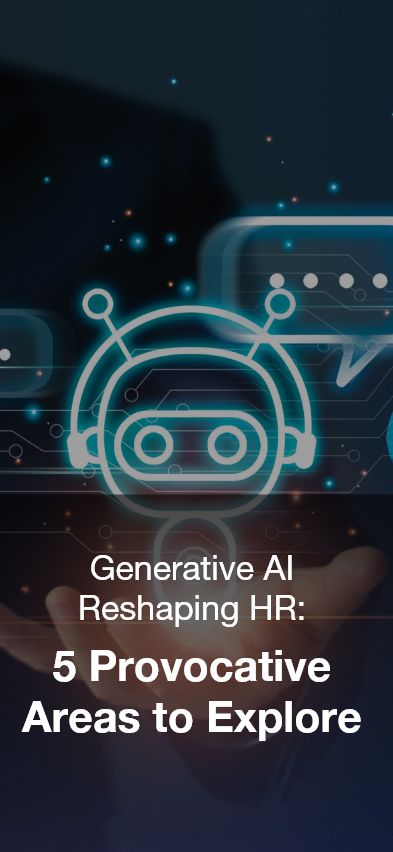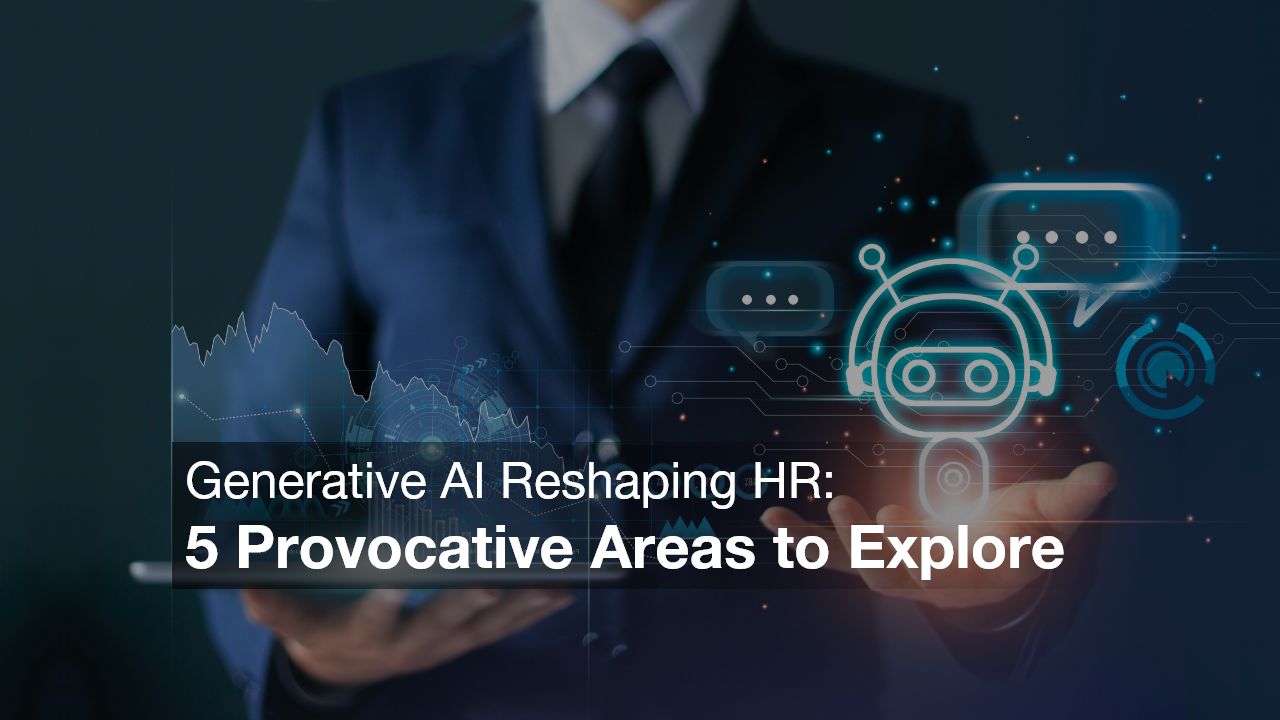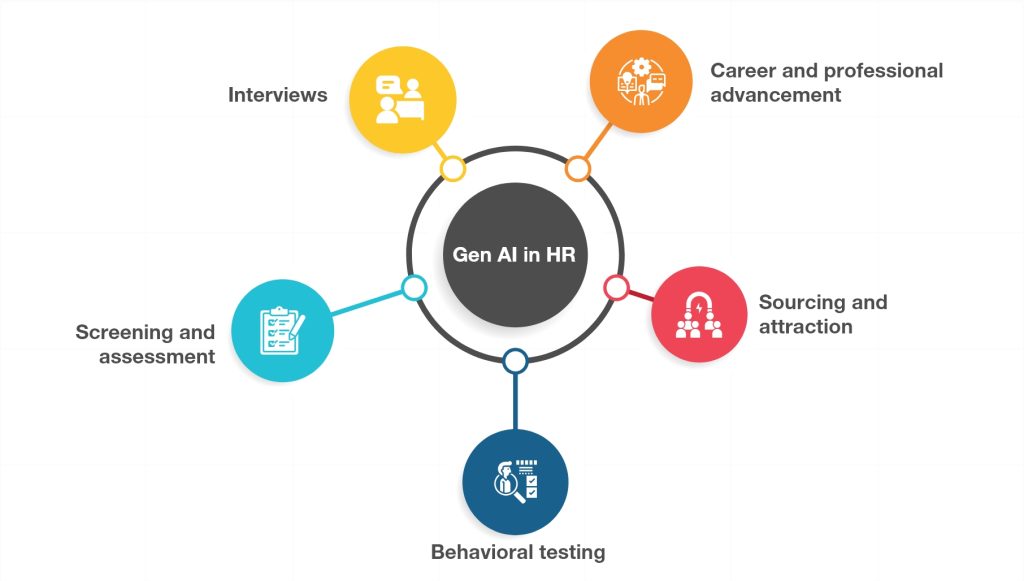

Posted On Aug 28 2024 | 10:47
Generative AI Reshaping HR: 5 Provocative Areas to Explore
In November 2022, the launch of OpenAI’s ChatGPT 3.5 triggered a revolutionary shift in the realm of generative AI. This shift has significantly influenced work processes across all business sectors, including HR functions.
The pivotal influence of the workforce and skills on enterprises cannot be overstated. By integrating AI capabilities into essential HR functions like recruitment, talent retention, and skill development, organizations can achieve profound transformation and enhance their competitive edge in the global market.
Know how enterprises can harness the power of generative AI with People Tech.
Reflect on these five notions and ensure they remain prominent as generative AI merges with the realm of HR

1.Transformative Role of Generative AI in Career and Professional Advancement
Generative AI holds significant potential as a transformative instrument for reshaping carers. By analyzing an individual’s skills, experience, and goals, generative AI can create personalized development plans that help people advance in their careers.
Listed below are several methods through which generative AI can help:
- Identify skills gaps. Generative AI can analyze skills and experience to identify gaps that need to be filled. This information can help to create a development plan to improve skills and advance career.
- Find relevant training courses. Generative AI can recommend relevant training courses that can help fill skills gaps. This can save time and money in finding the right training.
- Connect you with mentors and experts. Generative AI can connect with mentors and experts who can help advance one's career. This can provide valuable guidance and support.
- Track your progress. Generative AI can track progress as one works to advance their career. This can help a candidate to stay motivated and on track.
2.Generative AI for Sourcing and Attraction
Generative AI has the ability to produce captivating content and interactive chatbots that mimic a human recruiter’s personalized assistance. This can boost candidate engagement and drive more applications. AI can also be used to create more compelling job descriptions infused with rich company insights and role details. This can help to attract the right candidates. However, it is important to note that effective utilization of AI in career websites requires a subsequent review and validation process by human personnel.
Dive into few examples of how generative AI can be used for career website sourcing and attraction:
- Chatbots have the capability to respond to inquiries from candidates about a company's culture, benefits, and job openings.
- Chatbots can be employed to lead candidates through the job application process, from submitting their resume to scheduling an interview.
- Chatbots can be used to provide personalized feedback to candidates on their resumes and cover letters.
- Generative AI can be utilized to craft more captivating and informative job descriptions.
3.Generative AI for Behavioral Testing
Generative AI can design more intricate personality tests that are harder to manipulate. It learns from measurable facts (like KPIs) rather than opinions. This makes it challenging for candidates to guess answers just by reading job descriptions. Additionally, Generative AI can improve accuracy and fairness. Unlike humans who can have biases, Generative AI models remain neutral, resulting in more unbiased and just evaluations of candidates.
Check some examples of how generative AI can be used for behavioral testing:
- Generative AI has the capability to produce realistic and engaging scenarios for candidates to respond to.
- Generative AI can be used to analyze a candidate's responses to identify patterns and trends that can be used to assess their personality and behavior.
4.Candidate Screening and Assessments
Companies incorporating AI in their processes must ensure they effectively address and prevent biases. They should be able to prove the trustworthiness of their claims that AI avoids biases in tasks like reviewing resumes, testing skills, and assessing personalities. Interestingly, AI’s essential role in this context could be its ability to detect if a candidate’s response is generated by a machine, ensuring genuine interactions.
In addition to identifying machine-generated responses, AI can also be used to:
- Screen resumes for keywords and skills that are relevant to job openings.
- Evaluate the candidate's skills and abilities through assessments and simulations.
- Evaluate the candidate's personality and alignment with the company culture.
5.Job interviews
Check out some specific examples of how AI can be used in job interviews:
- Interview questions: AI can be used to generate a pool of potential interview questions based on the job description, critical competencies, and candidate seniority.
- Post-interview follow-up: AI can be used to provide insights into different post-interview scenarios, such as how to write thank-you notes, how to follow up with candidates, and how to handle rejections.
- Offer negotiations: AI can provide strategies for managing offer negotiation discussions, such as how to research market salaries and negotiate effectively.
Advantages of AI in talent acquisition and management:
- Enhanced candidate attraction and engagement: AI can be employed to generate experiences for candidates that are both more tailored and compelling, which can help to attract and retain top talent.
- Less emphasis on skills-based assessments: AI can be used to assess a candidate's skills and abilities more accurately and efficiently, making it less necessary to rely on skills-based assessments.
- Increased focus on cultural and personal fit: AI can be used to assess a candidate's cultural and personal fit for a role, which is often more important than skills and abilities.
- A proactive approach to learning and development: AI can create a proactive approach to learning and development, helping employees stay up to date on the latest skills and knowledge.
In this emerging era, the potential of generative AI to provide tailored guidance is more pronounced than ever. The range of applications benefiting from generative AI is consistently growing, underscoring the significance of its implementation. Regardless of your current progress on this path, the combined endeavors of People Tech Group and UKG stand ready to confront the complex queries you encounter.
